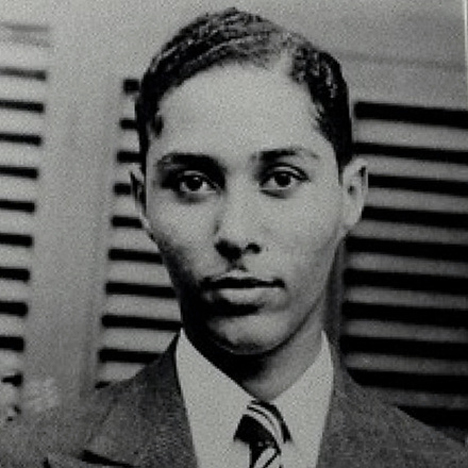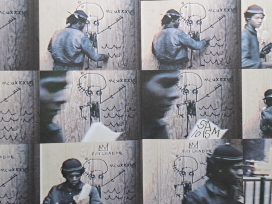Stuart Hall died on 10 February this year, Richard Hoggart on 10 April. In just two months we lost two of the three architects of British Cultural Studies (the third, Raymond Williams, had died in 1988). This grim news came as Birmingham University was gearing up for a major conference marking 50 years since the foundation of the Centre for Contemporary Cultural Studies (CCCS) at Birmingham University. Hoggart, then a professor of English, was the first director of the centre, and a young Jamaican academic, Hall, was his first appointment. In 1969, Hoggart moved on to become assistant director at UNESCO, and Hall took over as director of the Birmingham centre that became the incubator of a new approach to the study of culture.
By the time of his death, Hoggart, then 95, had been suffering from dementia for some time and had long been out of public life. Though into his 80s, Hall remained an influential public figure, and had even, after many of years of serious illness, appeared to be making something of a comeback. In 2013, together with his colleagues on the journal Soundings, Doreen Massey and Mike Rustin, he had launched the ambitious “Kilburn Manifesto”, subtitled “After Neoliberalism”, which aspired to reinvigorate leftist cultural analysis by diagnosing the recent banking crisis, and offering suggestions for a cure. If not exactly a surprise, Hall’s death was greeted with great shock and sadness. This sadness has everything to do with the fact that Hall was universally admired and much loved by those who knew him and his work – but it was also tinged, in my view, with a good deal of despondency about the fate of the discipline Hall and Hoggart had founded.
Though Cultural Studies has been among the most successful academic brands of the late 20th century, spawning a network of departments, international conferences, journals and shelfloads of publications, the mood of the anniversary, even before the death of its most famous exponents, was distinctly melancholic. In some sense this was nothing new. Cultural Studies was always embattled. As an attempt to subvert traditional academic disciplines by promiscuously mixing methods and refusing to settle on a clear canon or disciplinary framework, Cultural Studies had always been an academic outsider, beset by attacks from established disciplines like English or Sociology, as well as dissent within.
In a recent series of interviews on YouTube with Sut Jhally, Hall voiced criticism of the way that Cultural Studies, once so politically engaged, had become an uncritical form of media studies, too willing to celebrate the resistant potential of any kind of mass culture and devoting excessive space to celebrating the latest big-budget American box set, when there are, as he puts it, “other things going on that require our attention” – things such as the global banking crisis or the new realities of the digital economy. Cultural Studies, Hall feared, had become a machine for generating cultural theory, rather than a method of using theory to understand the world. He had not given up on the Cultural Studies “project”, but hardly seemed optimistic about its possible futures, noting wryly that Cultural Studies was “not in a healthy state”.
In many ways, Cultural Studies has been a victim of its own success. The Birmingham version – which combines sociological fieldwork with textual analysis, Marxist political economy, semiotics and high theory – has been hugely influential. In the late 1980s, the humanities underwent what is often called “the cultural turn”, a new interest in the production and consumption of meanings through cultural texts and processes, with a particular emphasis on popular culture – television, pop music, street style, slang. And it did not stop with the humanities. The Cultural Studies argument is that culture – the “stories we tell ourselves about ourselves” – is “constitutive” of all other realms; even when we are thinking about maths or economies or laws, we are doing our thinking within culture. Culture provides the categories that make any thinking possible, and, as the Italian Marxist Antonio Gramsci – a huge influence on Hall – argued, it is in culture that ideology becomes disguised as common sense. Part of the Cultural Studies project was to reveal the hidden biases that lie behind the taken-for-granted in any discipline, any era.
After he left Birmingham, Hoggart served tirelessly on dozens of quangos and committees – making his distinctive no-bullshit contribution to several important cultural moments, including his now famous defence of Lady Chatterley’s Lover, which is thought to have definitively swayed the jury in the notorious obscenity trial. He ended his career as a very effective Warden of Goldsmiths College. Hall, after overseeing the Centre’s most prolific decade of research, left Birmingham in 1979 for a professorship at the Open University and became one of the most cited and influential British intellectuals of the era. Graduates of the CCCS – Angela McRobbbie, Paul Gilroy, Lawrence Grossberg, Ros Coward, Simon Frith, Graeme Turner, Tony Bennett, Chen Kuan-Hsing, professors all – adorn the top tier of universities in Britain, America, Australia, Taiwan and Singapore. Some form of Cultural Studies is taught in most universities. So why all the anxiety?
My own case might throw some light here. A year ago, I found myself back in academia after ten years as a journalist, required to prepare a new course at the School of Oriental and African Studies in London, called, somewhat unpithily, “Analytical Approaches to the Global Creative and Cultural Industries”. This is designed to give students an overview of what used to be called “the arts” and “the media” in a globalized digital age, and to consider this all in relation to politics and culture. I ended up peppering the reading list with Cultural Studies texts (many of the original CCCS documents are now available online thanks to a project of the Birmingham history department) and I wrote a couple of lectures focusing on Cultural Studies, its past and future.
Yet, as I re-read this material, I could not avoid the question of how well Cultural Studies has aged, and how usefully concepts and perspectives developed in a specific context in postwar Britain could be applied globally. This being SOAS, my students were a diverse bunch: only three were Brits, the rest from across Europe, the Americas and the Far East. Early on, it became clear that I might have to revise my approach. Lecturing on how Dick Hebdige was influenced by the French semiotician Roland Barthes in describing punk style as a form of “semiotic guerrilla warfare”, I looked up at a sea of blank faces; it became clear that many students did not know what a punk was, let alone a ted, rude boy, skinhead, grammar school, Thatcherism, mugging, “sus”, Jackie magazine or Nationwide (to choose some Cultural Studies objects at random). The sessions on British Cultural Studies became primers in postwar British history, which were fun to teach, but did not exactly amount to “analytical approaches to the global creative and cultural industries”. Was any of this stuff going to provide a useful model for the analysis of (to take a few typical SOAS subjects), the rise of Korean soap opera in Thailand, the relation between innovation and tradition in Tunisian street dance or the politics of Swahili rap in Dar-es-Salaam? In other words, if I want to teach global pop culture to a group of postgraduates from around the world, does it make sense to route it through the West Midlands circa 1978?
As I sit down to rewrite the course for the coming term I’m trimming out quite a lot of Cultural Studies, but I’m keeping Hoggart and Hall on the syllabus. Here’s why: for founding the CCCS, Hoggart deserves great credit, but his real intellectual contribution to Cultural Studies was made a decade earlier in 1956, with the publication of his best-selling study of working-class culture in Leeds, The Uses of Literacy. The book’s two core arguments had an instant impact on a postwar society undergoing rapid change. The first was that culture, rather than being some kind of ideal achievement, a possession of the refined of a certain class and education, was what everyone has. In particular, the working class, long overlooked or denigrated in cultural analysis, had a valid culture of their own, sedimented in their own ways of life; in jokes, sayings and songs. That the idea of working-class culture does not appear to us an oxymoron is a credit to the impact of Hoggart’s book.
Hoggart’s second argument was that this kind of authentic working-class culture was imperilled by the arrival of Americanized commercial culture, the trivial “candy floss” world of mass entertainment: television, rock ‘n’ roll and juice bars. Though he published dozens of other books and articles, nothing Hoggart wrote or did since had a comparable impact.
The Uses of Literacy is a fundamental text for Cultural Studies because of its insistence on the value of the ordinary culture of the working class. It ignited a popular and academic interest in the everyday, the overlooked and the seemingly inconsequential. But arguably as important was the way that The Uses of Literacy stood as something that Cultural Studies could argue against. Though Hoggart was trying to make a break with cultural snobbery, his characterisation of the “barbarities” of pop culture was firmly in the tradition of conservative cultural criticism, from Matthew Arnold to Mary Whitehouse. A whole field of enquiry was inspired by what Hoggart was unwilling to do: that is, to recognize that the way in which people make use of cultural products and commodities reveals them not as passive victims of the ruling class, but as active makers of their own culture and identity. Hence much of what comes out of the golden age of Cultural Studies – Hall and Tony Jefferson’s edited collection Resistance through Rituals, Dick Hebdige’s Subculture, a study of “the meaning of style”, or Paul Gilroy’s analysis of racism in There Ain’t No Black in the Union Jack – emerges from an extended argument with and reaction to The Uses of Literacy.
All of this, I have found, can be put across to students if they are given some extracts from The Uses of Literacy to read for themselves, especially the bits where Hoggart talks in such scathingly moralistic terms about the British working-class youth in thrall to American popular culture, like this from his chapter on the “juke box boys”:
boys aged between fifteen and twenty, with drape-suits, picture ties, and an American slouch… the nickelodeon is allowed to blare out so that the noise would be sufficient to fill a good-sized ballroom. The young men waggle one shoulder or stare, as desperately as Humphrey Bogart, across the tubular chairs. Compared even with the pub round the corner, this is all a peculiarly thin and pallid form of dissipation, a sort of spiritual dry rot.
This is stirring stuff and there is nothing quite like it in the rest of the Cultural Studies corpus. “It is”, Hoggart admitted to DJ Taylor in 2007, “a very puritanical book.” I think it’s probably a good thing that Cultural Studies did not, by and large, follow Hoggart’s lead; there’s quite enough moralistic huffing and puffing in contemporary journalism and social media. Yet Hoggart’s voice, which still carries the unmistakable sardonic tang of the East Riding, where the specialism is the slyly judged put-down of the self-regarding and the puncturing of pretentions, remains a welcome echo of that moment in British history, one that is getting fainter.
The legacy of Hall is, in my view, of a quite different order. While Hoggart’s impact on Cultural Studies is concentrated between the covers of just one book, Hall’s is dispersed across the entire field. Though he wrote one very influential book on Thatcherism – The Hard Road to Renewal – Hall’s primary oeuvre was the essay and the co-edited collection. It was as if the world, and his attempt to grasp it, was moving too fast to spend time closeted away writing a book. For six decades, Hall promiscuously fired out academic writing and political journalism on a dizzying array of subjects that now define the Cultural Studies field – from debates with Althusser over Marxist theory, to analysis of how television constructs reality, to manifestos for the New Left, to readings of diaspora arts, hippies, the common market, globalisation, the Gulf War – all subjected to his analytic eye.
Though Hall’s particular brand of theorising – patient and modulated rather than fiery and opinionated – is not to everyone’s taste, he had the unarguable knack of making complex ideas intelligible, and fitting what might look like discrete cultural phenomena into larger patterns, which always, for him, came down to power relations. In short, Hall was an inspired teacher. I saw him lecture a few times and he was both amazingly calm and clear and absolutely riveting. He was also unflaggingly generous to those around him, particularly students and junior colleagues. He continues to have much to teach.
From the wealth of Hall’s written work, I’ve plucked two short essays as set reading for my course. In “Notes on Deconstructing the Popular”, written for Raphael Samuel’s Radical History Workshop in 1981, Hall makes the case that “popular” culture is neither the authentic voice of the people (as we imagine folk culture to be) nor that which is imposed from above by corporate manipulators (as in the kind of mass culture that Hoggart despised) but a kind of terrain, a battleground where a struggle between these forces is staged. This still fresh idea reminds students to suppress their moralising and received opinions about the meaning of a particular cultural form, to analyse texts and contexts in detail and be aware of the way different meanings with possibly contradictory political inflections can be articulated within the same cultural formation. There has been a lot of crap written within Cultural Studies, of course, just as in every other academic field, but most of the best analyses of pop culture – Jostein Gripsrud’s reading of the soap opera Dynasty and Gilroy’s writing about black popular music are two of my personal favourites – are indebted to Hall’s model of popular culture as a battlefield where a struggle between freedom and exploitation is played out.
Hall, above all, represents the idea that (popular) culture matters and because of this we need to treat it with care and attention, not merely conscript it into our own political battles. He famously says at the end of this essay that it is because popular culture is a site of political contestation that it matters to him, and if it weren’t, then he wouldn’t give a damn about it. I’ve always liked that line because it gives the lie to the idea that Cultural Studies, at least in origin, is merely a vapid celebration of pop culture. It also hints that Hall, despite his lifelong attempt to free himself from the high-art prejudices of Leavisite “New Criticism”, was at heart a high modernist, as he revealed on Desert Island Discs with his selection of jazz by Charlie Parker, Miles Davis and Wynton Marsalis. The founder of the study of popular culture was no populist.
The other essay, “New Ethnicities”, from 1989, is important for what it says about race and identity. Starting as he usually does with the concrete – the emergence of a radical black film movement in the 1980s – Hall suggests that the arrival of this kind of black British art signals the end of a particular phase of “defensive” black politics, the phase that required a strategic notion of black particularity and solidarity, which was ultimately just the mirror image of racism. In the often overheated context of the politics of race, Hall’s audacity still impresses. He calls for an end to “innocent notions of the black subject” (which might suggest, for example, that just because a black person made a film, it must be a good film) and develops a new idea of ethnicity that recognizes that race is (in a typical Hall phrase) no guarantee of solidarity or progressive politics; identity is multiple and contingent, subject to change and adaptation, fluid and hybrid, not fixed and pure, never full or complete, always in the process of becoming.
Similarly, therefore, culture cannot be thought of as the simple expression of the essence of a people or race (there is no such essence) but as the “articulation” (which in Hall’s sense means both speaking and joined together, as in “articulated lorry”) of a particular subject position. By analogy, culture is not pure but mixed, just as society cannot be “monocultural”, though at times of stress it might strive to imagine itself as such. This argument led Hall to be dubbed the “godfather of multiculturalism”, much to his irritation, and still provides for my students the necessary starting point for thinking through the politics of race and identity and the basic processes of cultural development, not just in 1980s Britain but everywhere. In every situation, at any “conjuncture” (another Hall word that means, basically, the sum of the forces that go to making up the here and now), the mix is specific but the form is general, and we still need what he calls the “detour through theory” as a way to see these general patterns.
For some people, the idea of culture as a site of struggle probably seems anachronistic, carrying as it does such a strong whiff of the culture wars of the 1970s, all patchouli and crisis and sit-ins and futile calls for revolution. These people can turn to new wannabe intellectual brands like “creative industries” that have ditched Cultural Studies’ Marxism and wariness of collaborations with policy makers and corporations, in favour of a cheery view of the progressive potential of new technologies and entrepreneurism. But for those who are alive to the growing inequalities and iniquities of the global economy, Hall’s model of culture as a site of struggle makes more sense than ever. And the stakes in this struggle, as Hall reminds us time and again, couldn’t be higher – nothing less than the conditions of possibility for human freedom.







